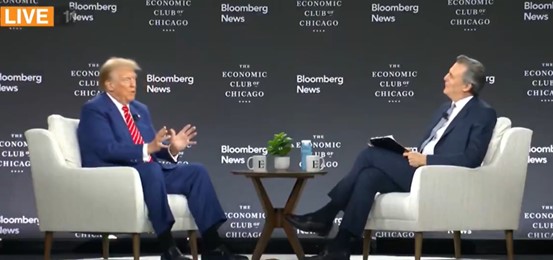President Trump’s recent interview with Bloomberg editor-in-chief John Micklethwait at the Economic Club of Chicago showcased the former president’s signature blend of bravado and economic discourse. During the exchange, which primarily focused on Trump’s economic policies, the discussion took a notable turn when tariffs were brought into question. Displaying a confidence mirrored by his administration’s economic results, Trump defended his tariff strategy, emphasizing its unprecedented impact on job growth. Notably, both Black and Hispanic unemployment rates reached historic lows during his tenure, which Trump used as a benchmark to highlight the success of his economic approach in reversing decades of perceived trade injustices.
Micklethwait, who appeared to challenge Trump on the implications of imposing tariffs, became the unwitting subject of a pointed rebuke from the former president. Trump, in a moment of comedic relief, noted how challenging it must be for Micklethwait—who had spent years discussing tariffs in a negative light—to face someone who could convincingly argue the opposite. This comment elicited a strong response from the audience, showcasing Trump’s ability to connect with his supporters through humor while asserting his economic perspective. The dynamic between the two was palpable, with Micklethwait’s academic tone clashing against Trump’s more populist approach to economic issues.
During the interview, the former president maintained that the tariffs were set to have a “massive positive effect” on the American economy. This assertion was met with skepticism from Micklethwait, who cautioned about the potential negative consequences on jobs reliant on trade. However, Trump countered by referencing the case of John Deere, a major American company, asserting that their decision to build plants outside the United States was a direct outcome of his trade policies. This highlighted a narrative where Trump positioned himself as a defender of American interests against corporations that might opt for cheaper labor overseas.
Trump’s retort underscored a broader theme of his administration—the assertion that American manufacturing could be revitalized through strategic economic policies. By framing his tariff plan as a vital step toward reclaiming American jobs, Trump sought to reassure his audience that he was committed to enhancing domestic production. Micklethwait’s challenge regarding the potential fallout from trade policy failed to significantly rattle Trump, who instead used the moment to reaffirm his stance and underscore the resilience of the American workforce.
Further into the conversation, the former president reiterated his belief that American companies would ultimately benefit from his trade strategies. He dismissed Micklethwait’s concerns about job losses stemming from tariffs, positing that companies would adapt and that jobs would eventually come back. This optimistic outlook mirrored the ethos Trump often championed during his presidency, characterizing his administration’s focus on American-made products as a pathway to economic renewal. It was a perspective that resonated deeply with many in the audience, who perceived the administration’s approach as a necessary correction to decades of perceived neglect in trade practices.
In conclusion, the interview proved to be a critical moment not only for Trump, but also as a representation of the ongoing debate over trade and tariffs in America. Trump’s ability to dominate the conversation, coupled with his skillful humor, showcased how he continues to engage with key economic issues that resonate with his base. Despite Micklethwait’s intent to challenge Trump, the interaction highlighted Trump’s resolved position on trade—viewing tariffs as a tactical means to bolster the American economy and secure jobs. The exchange serves as a reminder of the polarized viewpoints surrounding economic policy, where Trump’s unabashed confidence often leaves a lasting impression, particularly amongst supporters who favor a more nationalist approach to trade.

